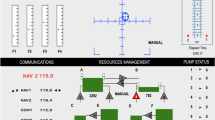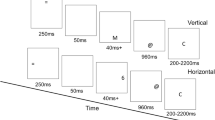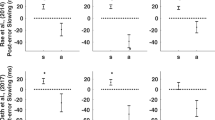Abstract
The intent of this study was to determine whether performance on an error detection task and a series of cognitive search and memory tasks would be affected if performed serially. Fifty-six participants were assigned into two experimental groups, defined by whether they performed the error detection task or the cognitive tasks first. Measures of hit rates and false alarms were taken for the error detection task, and the perceived workload of both tasks was measured immediately following completion. In the group that did the cognitive tasks first, a significant relationship between perceptions of mental demand on the cognitive tasks and subsequent performance on the error detection task was found. Also, false alarms in error detection were correlated with perceptions of time pressure and frustration measured after the error detection task. These results suggest that a mentally demanding initial task may facilitate performance in a subsequent cognitively-based task.
Similar content being viewed by others
References
Allan, E.L., Barker, K.N., Malloy, M.J., & Heller, W.M. (1995). Dispensing errors and counseling in community practice. American Pharmacy, 12, 25–33.
Baddeley, A.D. (1997). Human memory: Theory and practice. Hove, UK: Psychology Press.
Bilsing-Palacio, L. & Schell, K.L. (2003). Signal probability effects on error detection performance in a quality control task. Psychological Reports, 93, 343–352.
Davies, D.R. & Parasuraman, R. (1982). The psychology of vigilance. London: Academic Press.
Dickinson, J., Byblow, W.D., & Ryan, L.A. (1993). Order effects and the weighting process in workload assessment. Applied Ergonomics, 24, 357–361.
Grasha, A.F. (2000). Into the abyss: Seven principles for managing error in complex systems. American Journal of Health System Pharmacy, 57, 554–564.
Grasha, A.F., Reilley, S., Schell, K.L., Tranum, D., & Filburn, J. (2000). A cognitive systems perspective on human performance in the pharmacy: Implications for accuracy, effectiveness, and job satisfaction. (Technical Report 062100-R). Cincinnati, OH: Cognitive-Systems Performance Laboratory, University of Cincinnati.
Green, D.M., & Swets, J.A. (1974). Signal detection theory and psychophysics. Oxford: Robert E. Kreiger.
Hart, S.G. & Staveland, L.E. (1988). Development of NASA-TLX (Task Load Index): Results of empirical and theoretical research. In P. A. Hancock & N. Meshkati (Eds.), Human mental workload. (pp. 139–183). Amsterdam: North-Holland.
Kahneman, D. (1973). Attention and effort. Englewood Cliffs, NJ: Prentice Hall.
Knowles, W.B. (1963). Operator loading tasks. Human Factors, 5, 155–161.
Logie, R.H. (1995). Visuo-spatial working memory. Hove, UK: Lawrence Erlbaum.
Matthews, G., Davies, D.R., Westerman, S.J. & Stammers, R.B. (2000). Human performance: Cognition, stress and individual differences. Philadelphia, PA: Taylor & Francis.
Moray, N. (1967). Where is capacity limited? A survey and a model. Acta Psychologica, 27, 84–92.
Navon, D. & Gopher, D. (1979). On the economy of the human processing system. Psychological Review, 86, 214–255.
Norman, D.A. & Bobrow, D.B. (1975). On data-limited and resource-limited processes. Cognitive Psychology, 7, 44–64.
Nygren, T.E. (1991). Psychometric properties of subjective workload measurement techniques: Implications for their use in the assessment of perceived mental workload. Human Factors, 33, 17–33.
O'Donnell, R.D. & Eggemeier, F.T. (1986). Workload assessment methodology. In K.R. Boff, L. Kaufman, & J.P. Thomas (Eds.), Handbook of human performance. Vol. 2. Cognitive processes and performance. (pp. 25–51). Chichester: John Wiley and Sons.
Reilley, S., Grasha, A.F. & Schafer, J. (2002). Workload, error detection and experienced stress in a simulated pharmacy verification task. Perceptual & Motor Skills, 95, 27–46.
Sanders, M.S. & McCo-rmick, E.J. (1993). Human factors in engineering and design. (7th Ed.). New York: McGraw-Hill.
Schell, K.L., Woodruff, A., Corbin, B., Bilsing, L. & Melton, E. (2002). A comprehensive investigation of error detection effectiveness in a complex product verification task. (Technical Report 0802-01). San Angelo, TX: Human Performance Laboratory, Angelo State University.
Warm, J.S. (1984). An introduction to vigilance. In J. S. Warm (Ed.), Sustained attention in human performance. Chichester: John Wiley & Sons.
Wickens, C.D. (1991). Processing resources and attention. In D.L. Damos (Ed.), Multiple-task performance, (pp. 145–178). London: Taylor & Francis.
Wickens, C.D. (1992). Engineering psychology and human performance (2nd Edition). New York: Harper Collins.
Wickens, C.D. & Hollands, J.G. (2000). Engineering psychology and human performance. (3rd Ed.). Upper Saddle River, NJ: Prentice Hall.
Author information
Authors and Affiliations
Corresponding author
Rights and permissions
About this article
Cite this article
Schell, K.L. Improving accuracy in an error detection task via task sequence. Curr Psychol 23, 305–317 (2004). https://doi.org/10.1007/s12144-004-1003-4
Issue Date:
DOI: https://doi.org/10.1007/s12144-004-1003-4




